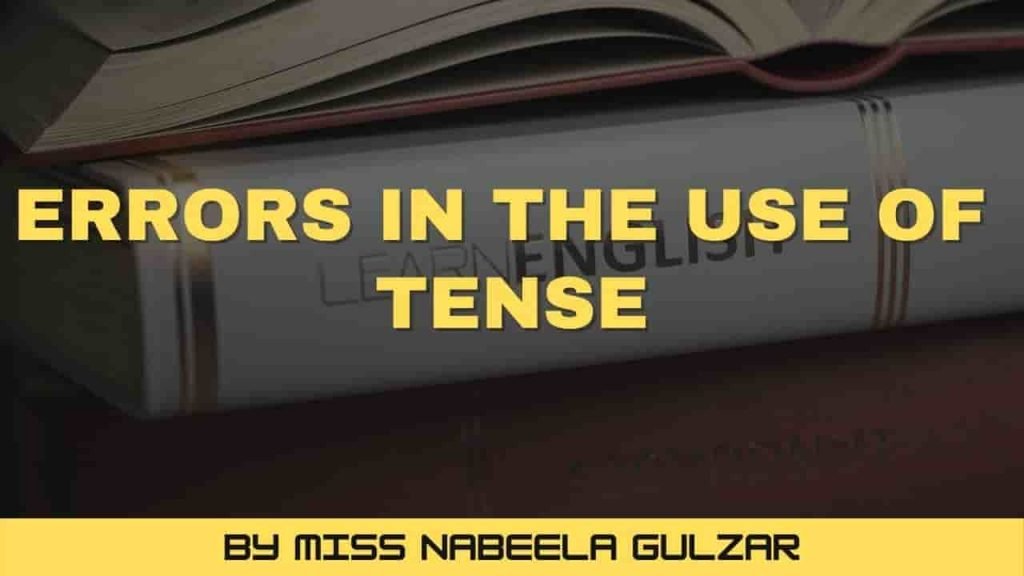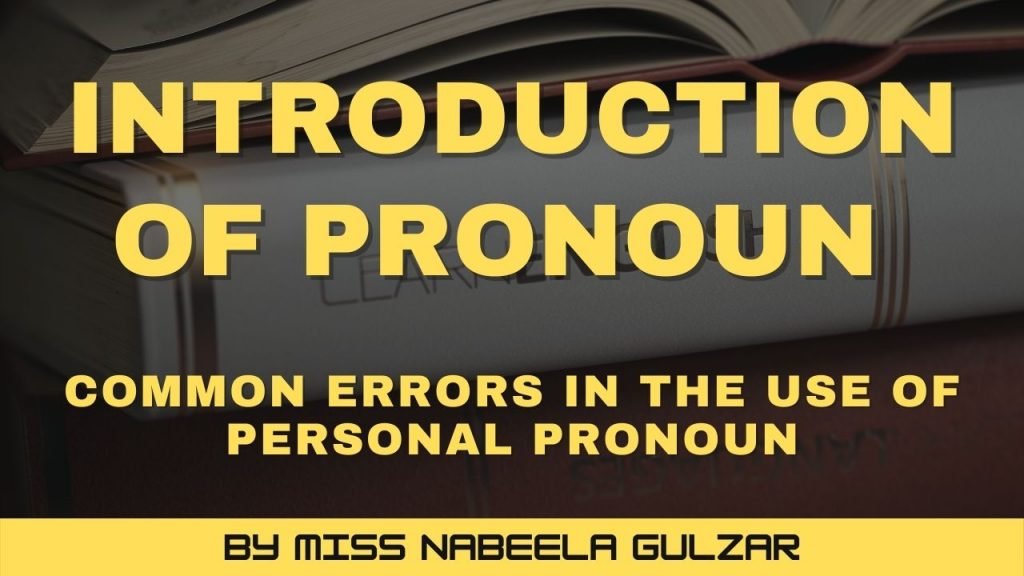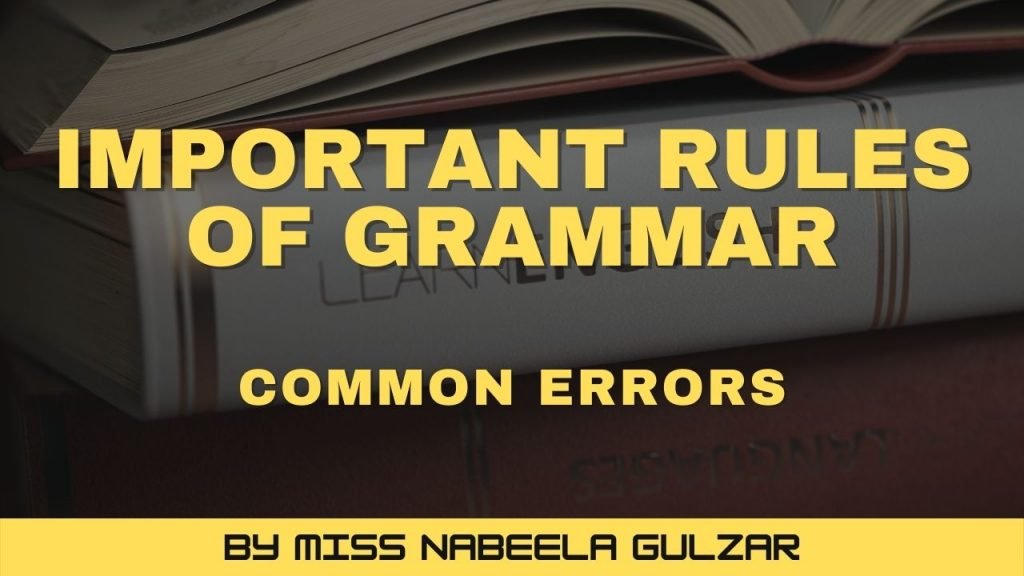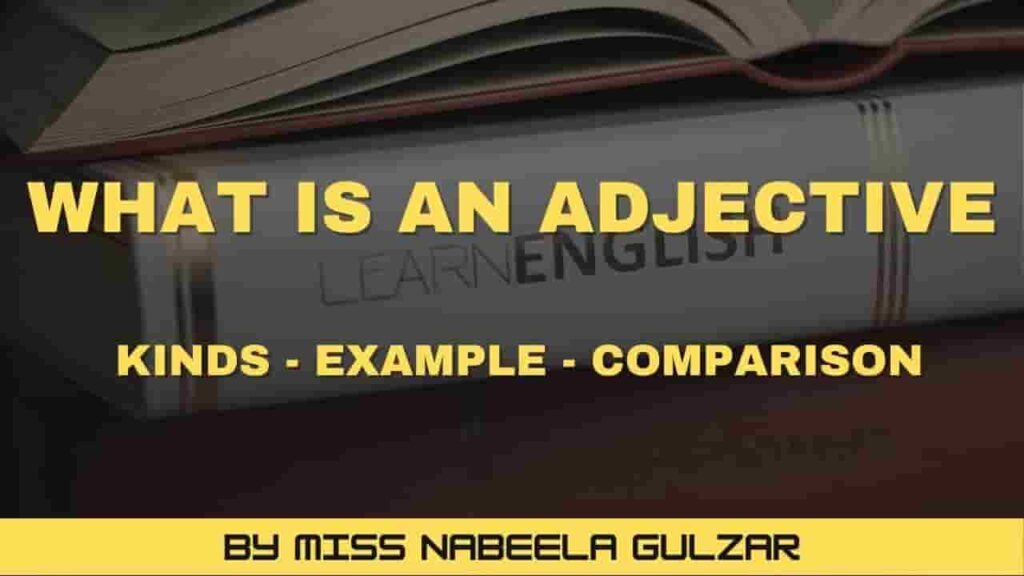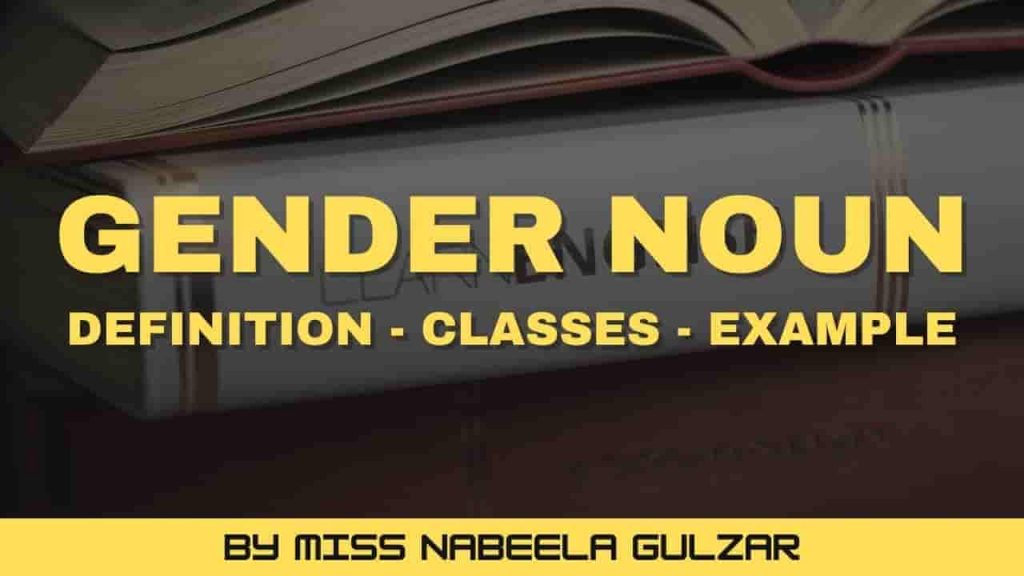Errors in The Use Of Tense
Past tense followed by Past tense
1. If there is past tense in the principal clause, it must be followed by past tense in a subordinate clause. However there is an exception in it: The past tense in the principal clause may be followed by a Present tense to express universal truth.
Examples:
1. He said that he is a student of Islamia college. (incorrect)
He said that he was a student of Islamia college.(correct)
2. He said that he will go to Lahore tomorrow.(incorrect)
He said that he would go to Lahore tomorrow .(correct)
3. He said that the earth moved round the sun.(incorrect)
He said that the earth moves round the sun.(correct)
Errors of Future Tense
2. We use ‘shall’ with ‘I’ and ‘We’, in future tense and ‘will’ with He, She, It, they and with singular names.
Examples:
1. We will go to Karachi next month.(incorrect)
We shall go to Karachi next month. (correct)
2. They shall come in time. (incorrect)
They will come in time. (correct)
3۔ Future tense is never used twice in a sentence. First part of the sentence should be done in Present Simple Tense and the other in future.
Examples:
1. I shall go to Karachi and you will not follow me. (incorrect)
I go to Karachi and you will not follow me. (correct)
2. I shall be drowned and nobody will save me. (incorrect)
I drown and nobody will save me. (correct)
Perfect Continuous tense instead of continuous tense with time expression since and for
4. If since or for is used to indicate time in the present continuous and past or past continuous tense. Always use ‘has been, have been and had been’ in the sentences.
Examples:
1. It is raining since morning. (incorrect)
It has been raining since morning. (correct)
2. It was snowing on the mountains for two days. (incorrect)
It had been snowing on the mountains for two days. (correct)
5. Do not use had + 3rd form in a simple sentence without adverb or conjunction. Change such sentences into past simple.
He had gone to Lahore when I came. (correct)
Adverbs: till, never, already, never before, ever before.
He had already gone to Lahore.(correct)
Examples:
1. He had gone to Lahore yesterday. (incorrect)
He went to Lahore yesterday. (correct)
(simple past as no adverb or conjunction is used here)
2. He already went to Lahore. (incorrect)
He had already gone to Lahore. (correct)
(adverb is used here. So we used had + 3rd form)
6. Always use simple past with such expressions ago, yesterday and last etc.
The use of following words in a sentence indicates past simple tense.
Yesterday, Ago, Last night (day) etc.
Examples:
1. I have received your letter yesterday. (incorrect)
I received your letter yesterday. (correct)
2. He has died a year ago. (incorrect)
He died a year ago. (correct)
7. The use of following adverbs indicate present/ past perfect.
Till, Never, Just now, Already.
1. I received your letter just now. (incorrect)
I have received your letter just now. (correct)
2. I did not pay the telephone bill yet. (incorrect)
I have not paid the telephone bill yet. (correct)
3. I already went to the station. (incorrect)
I had already gone to the station. (correct)
Errors in the use of Tenses
Conditional Tense:
8. In a conditional sentence, if the first person contains+3rd form of the verb. The second part must contain would have, should have, might have+3rd form of verb.
Examples:
1. If he had worked hard, he would pass.(incorrect)
If he had worked hard , he would have passed.(correct)
2. If he went to Lahore, he would have brought toys for me.(incorrect)
If he had gone to Lahore, he would have brought toys for me.(correct)
9. Always use first form of verb with ‘Let’ and ‘To’
Examples:
1. Let him went there.(incorrect)
Let him go there. (correct)
2. He decided to have gone there.(incorrect)
He decided to go there.(correct)
10. Always use the helping verb to make an interrogative sentence.
Examples:
1. Where he went in the evening? (incorrect)
Where did he go in the evening?(correct)
2. Why he cries? (incorrect)
Why does he cry?(correct)
11. Do not use ‘not’ after forbid.
He forbade me not to smoke.(incorrect)
He forbade me to smoke.(correct)
12. Always use ‘were’ or ‘past tense’ after as if, or as though, it is time, I would rather.
Example:
He orders me as if I am his brother.(incorrect)
He orders me as if I were his brother. (correct)
Examples:
1. I would rather you apply for the post.(incorrect)
I would rather you applied for the post.(correct)
2. I wish I stay at home.(incorrect)
I wish I stayed at home.(correct)
3. It is time we go out.(incorrect)
It is time we went out.(correct)
Verbs followed by as:
13. The following verbs are followed by ‘as’ regard,represent, portray, mention, describe, treat, etc
Examples:
1. She is regarded the oldest women in the street.✖️
She is regarded as the oldest women in the street.(correct)
2. He is described the greatest poet of English literature.✖️
He is described as the greatest poet of English literature.(correct)
3. He is treated the greatest figure in history. ✖️
He is treated as the greatest figure in history. (correct)
Verbs followed by reflexive pronouns:
14. The following verbs immediately take the reflexive pronouns after them. It is used according to subject.
Avail, absent, avenge, enjoy, exert, make, help and acquit.
Reflexive Pronouns
| Pronoun | Reflexive Case | Pronoun | Reflexive case |
| I | Myself | He | Himself |
| We | Ourselves | She | Herself |
| You | Yourself | They | Themselves |
Examples:
1. He could not avail of opportunity. (incorrect)
He could not avail himself of opportunity.(correct)
2. Acquit well in that situation. (incorrect)
Acquit yourself well in that situation.(correct)
3. He avenged on the king.(incorrect)
He avenged himself on the king. (correct)
15. No Reflexive Pronoun after the following verbs
Keep, break, qualify, enlist ,bath, feed, steal, stop, make, hide, shave and dress.
Examples:
1. He kept himself away from school.(incorrect)
He kept away from school. (correct)
2. He qualified himself as a teacher.(incorrect)
He qualified as a teacher. (correct)
16. Do not use ‘that’ with clauses beginning with interrogative words such as ‘ what’ , where, why, when, if etc.
Example:
He asked me that where I lived. (incorrect)
He asked me where I lived.(correct)
17. Inside a sentence, the interrogative form of a sentence becomes positive.
Example:
He asked me where was i coming. (incorrect)
He asked me where I was coming. (correct)
Hopefully, your concept about Errors in The Use Of Tense is clear now, This lecture is part of the whole series of English Grammar by Miss Nabila Gulzar, For Other Lectures Click Here also We have an Essay on every topic, Check the complete list here. If you are Studying in Matric Free Video Lectures of Maths, Physics and English are here, and we have got you covered for I.COM Business Maths also.

